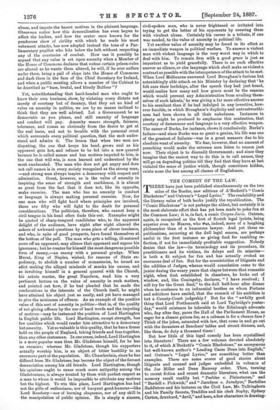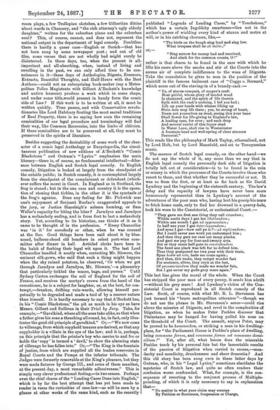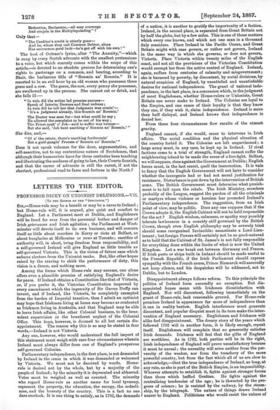THE COMEDY OF THE LAW.
THERE have just been published simultaneously on the two sides of the Border, new editions of A'Beckett's " Comic Blackstone" and Ontram's "Legal Lyrics." The readability and the literary value of both books justify the republication. The "Comic Blackstone" is not perhaps the ablest, but certainly it is the most elaborate effort that has yet been made to poke fun at the Common Law; it is, in fact, a comic Corpus Turis. Ontram, again, is recognised as the first of Scotch legal lyrists, being superior even to Heaves, who das, indeed, more of a laughing philosopher than of a humorous lawyer. And yet these re- publications, occurring at the doll legal season, are perhaps useful in the first instance as giving food for rambling re- flection, if not for immediately profitable suggestion. Nobody denies that the law—its terminology and its procedure, its practitioners and its victims, its delays and its miseries— is both a fit subject for fun and has actually evoked an enormous deal of fun. But for the eccentricities of litigants and the oddities of Judges, whence would consolation come to the junior during the weary years that elapse between that romantic night, when first established in chambers, he looks out of window, and, like Coningsby, declares, "I have resolved ; I will try for the Great Seal," to the dull half-hoar after dinner when he confesses to an influential brother on whom Fortune and solicitors have smiled, that the summit of his ambition is but a County-Court judgeship ? But for the " awfully good thing that Lord Forthmonth said at Lord Taybridge's yester- day," would existence be tolerable to the Edinburgh advocate who, day after day, paces the Hall of the Parliament House, as eager for a chance guinea-fee, as a cabman is for a chance fare P Think of the jokes, saturated with law, that come in and go out with the decanters at Benchers' tables and circuit dinners, and, like them, do duty a thousand times
But how little of this legal comedy has been crystallised into literature ! There are a few volumes devoted absolutely to it, of which A'Beckett's "Comic Blackstone," an anonymous but well-known author's " Leading Cases Done into English," and Ontram'e "Legal Lyrics," are something better than examples. There are some scores of good stories about litigants and counsel and judges embedded in volumes of the Joe Miller and Dean Ramsay order. Then, turning to recent fiction and recent dramatic literature, what can the memory recall readily but " Peebles v. Plainstanes," and "Barden v. Pickwick," and " Jarndyce v. Jarndyce," Bartoline Saddletree and his lectures on the Civil Law, Mr. Tulkinghorn and his Family Secrets, Traddles and his clerk Sophy, Sydney Carton, drunkard," devil," and hero, a few characters in drawing-
room plays, a few Trollopian sketches, a few Gilbertian ditties about wards in Chancery, and "the rioh attorney's ugly elderly daughter," written for the suburban piano and the suburban soul? This, of course, cannot, and does not, represent the motional output in the department of legal comedy. Doubtless there is hardly a queer case—English or Scotch—that has not been sung by some newspaper poet ; and out of old files, some verses that are not wholly bad might surely be disinterred. In these days, too, when the present is all- important and all-absorbing, when, instead of living and revelling in the past, we can only afford time to be con- noisseurs in it—these days of Anthologies, Digests, Essences, Extracts, Beautiful Thoughts, and Half-Hours with the Beet Authors—could not an enterprising book-maker (say a Metro- politan Police Magistrate with Gilbert A'Beckett's knowledge and native humour) produce a work which in some shape, and under some title,would present in handy form the comic side of Law ? If this work is to be written at all, it must be written quickly. Time passes, and with Conservative revolu- tionaries like Lord Halsbury flouting the most sacred traditions of Real Property, there is no saying how soon the remaining comicalities of our legal procedure and terminology will find their way, like Common Recoveries, into the limbo of oblivion. If these comicalities are to be preserved at all, they must be preserved in the spirits of literature.
Besides suggesting the desirability of some work of the char- acter of a comic legal Anthology or Encyclopmdia, the simul. taneous publication of new editions of A'Beckett's "Comic Blackstone" and Outram's " Lyrics " emphasises the main literary—there is, of course, no fundamental intellectual—difer- ence between English and Scotch legal comedy. In English comedy, litigation is looked at largely from the standpoint of the outside public; in Scotch comedy, it is contemplated largely from the standpoint of the complainant or defendant (which- ever suffers the more) in Court. In England as in Scotland, the frog is stoned ; but in the one case and country it is the opera- tion of stoning that tickles, in the other it is the spectacle of the frog's agonies. Does any feeling for Mr. Pickwick mar one's enjoyment of Serjeaut Sodas's exaggerated appeals to the jury, or Juatice Stareleigh's solemn humbug, or Sam Weller's capacity for biting the biter Jarndyce and Jarndyce has a melancholy ending, and is from first to last a melancholy story. Yet, according to its historian, one thinks of it as it came to be thought of in the profession. " Every Chancellor was 'in it' for somebody or other, when he was counsel at the Bar. Good things have been said about it by blue- nosed, bulbous-shoed old benchere in select port-wine com- mittee after dinner in hall. Articled clerks have been in the habit of fleshing their legal wit upon it. The last Lord Chancellor handled it neatly when, correcting Mr. Blowers, the eminent silk-gown, who said that such a thing might happen when the sky rained potatoes, he observed, Or when we get through Jarndyce and Jarndyce, Mr. Blowers,'—a pleasantry that particularly tickled the maces, bags, and purees." Until Sydney Carton exchanges the soil of England for the soil of France), and receives the martyr's crown from the band of the executioner, he is a subject for laughter, or, at the best, for con- tempt,--drunken, drifting ruin-wards, allowing himself per- petually to be degraded and made a tool of by a coarser nature than himself. It is hardly necessary to say that A'Beckett has, in his "Comic Blackstone," the pit as much in his eye as have Messrs. Gilbert and Sullivan in their Trial by Airy. Take, for example,—" Gavelkind, where all the eons take alike, so that when a father gives his sons a thrashing all round, he, in fact, only illus- trates the good old principle of gavelkind." Or,—"We now come to villenage, from which copyhold tenures are derived, so that any copyholder is a villain in the eye of the law; and it is, perhaps, on this principle that the printer's boy who carries to and fro or holds the copy' is termed a devil,' to show the alarming state .of villenage he has fallen into." Or,—" The King is the fountain of justice, from which are supplied all the leaden reservoirs in Royal Courts and the Pumps at the inferior tribunals. The Judges were formerly removable at the King's pleasure, but they were made fixtures by George III., and some of them manifest, at the present day, a most remarkable adhesiveness." This is simply very clever professional fooling,—in two senses. Perhaps even the chief charm of the " Leading Cases Done into English," which is by far the best attempt that has yet been made to render in verse the curiosities of case-law—as will be seen by a giallo° at other works of the same kind, such as the recently published "Legends of Leading Cases," by " Touchstone," which has a certain Ingoldaby smartness—lies not in the author's power of wielding every kind of stanza and metre at will, or in his catching choruses, like,—
" Tbe birds on the bough sing loud and sing low, What trespass shall be ab initio ;"
or,—
" Sing sorrow for money had and received,
And slack for the common counts, 0 !"
rather is that charm to be found in the ease with which he lifts his cases above the smoke and stir of the Courts into the serene air of complete indifference to the woes of litigants. Take the consolation he gives to men in the position of the plaintiff in the famous bailment case of " Coggs v. Bernard," which arose out of the staving-in of a brandy-cask :—
"Ye, of staves compact, of cooper's craft
Moat pitiful, whose glory of beaded wood
Is shattered, and the spirit of life therein
Spilt with the cask's undoing, I bid you hail; Lift up your heads with whets° lifting up Slain men may lift them ; yea, be strong of heart, Deem not yourselves as dead, seeing this your bane Shall flower for life-giving to England's law, A leading case, for ever ; and each drop And several runlet of this liquor shed In Water Lane, shall rise in Westminster A fountain-head and well-spring of clear streams Perennial."
This reads like the philosophy of Mark Tapley, etherealised, not
by Lord Holt, but by Lord Mansfield, and set to Tennysonian
music.
The essence of Scotch legal comedy, on the other hand—we do not say the whole of it, any more than we say that in English legal comedy the personally dark side of litigation is totally left out of consideration—is to be found in the ruin or misery in which the processes of the Courts involve those who resort to them, and that whether they be successful or not. It was so from the first, or at least as far back as Sir David Lyndsay and the beginning of the sixteenth century. The law's delay and the rapacity of lawyers have never been more humorously represented than in Lyndsay's account of the adventures of the poor man who, having lent his gossip his mare to fetch home coals, only to find her drowned in a quarry-hole, took his woes to the Coneistorial, or ecclesiastical Court :—
" They gave me first ane thing they call citatidum; Within aucht days I gat hot libellandunt ; Within ane month I gat ad opponendum ; In half ane year I gat inter-loquendum;
And sync I gat—how call ye it ?—ad rapticandum;
Bob I could never ane word yet understand him ;
And then they garb me cast out mony pleas, And gart me pay for four-and-twenty acts.
Bob or they came half-gate to concludendam The fiend ane plack was left for to defend him.
Thus they postponed me twa year with their train,
Syne liodie ad acts, bade me come again ;
And then, thir rooks, they rowpit wonder feet For sentence, silver, they cryit at the last,
Of pronunciandum they made me wonder fain,
Bob I gat never my gade grey mare again."
This last line gives the moral of the whole. When the Court has stripped the poor man of every penny, it sends him adrift —without his grey mare ! And Lyndsay 's victim of the Con- sistorial Court is reproduced in all Scotch comedy of the Law. Scott, of course, with what Mr. R. L. Stevenson has just termed his "brave metropolitan utterance "—though we do not use the phrase in Mr. Stevenson's sense—could rise above the miseries of litigants, and revel in the complexities of litigation, as when he makes Peter Peebles discover that Plainetanee may be hanged for having pulled his nose on the threshold of the Court. The assault, argues Peter, may be proved to be hamesucken, or striking a man in his dwelling- place, for " the Parliament House is Peebles's place of dwelling, being commune forum, and commune forum est commune dom..- cilium r' Yet, after all, what lesson does the miserable Peebles teach by his personal fate but the lamentable results of the passion of litigation when carried to excess,—men- dacity and mendicity, drunkenness and sheer dementia ? And this old story has been sung even in these latter days by Ontram, who, in his " Legal Lyrics," sometimes elucidates the mysteries of Scotch law, and quite as often renders their confusion worse confounded. What, for example, is the eon- sequence of resorting to the conjunct process of Multiple- poindiug, of which it is only necessary to say in explanation that-
" No matter in what your claim may emerge
By Petition or Summons, Suspension or Charge,
Reduction, Deolarator,—all may converge And conjoin in the Rultiplepoinding" Only that-
" The Creditor's credit is utterly gone— And be, whom they call Common Debtor, alone
Has uncommon good luck—he's got off with his own !"
The best of Outram's lyrics, after "The Annuity,"—which is sung by every Scotch advocate with the smallest pretensions to a voice, bat which scarcely comes within the scope of this article,—is devoted to an obsolete process for determining one's rights to pasturage on a common, and bearing, according to Stair, the barbarous title of "Soumin an' Ronmin." It is resorted to in an evil hour by an old woman who possesses three geese and a cow. The geese, the cow, every penny she possesses, are swallowed up in the process. She cannot eat or drink, and she falls ill:— "In vain did the writer lad promise success— Speak of Interim Decrees and final redress ; In vain did he tell her that Judgment was oomin'— ' It's a judgment already, this Soumin an' Roumin.'
The Doctor was sent for—bot what could he my ;
He allowed the complaint to be oat of his way ; The Priest spak' o' Job—said to stiffer was bnman- But she said, 'Job kent naetbisg o' Soumin an' Romnin.' " She dies, and,—
" Of a' the estate, there's naething forthoomin'
Bat a guid-gangin' Process o' Soumin an Roumin."
Does it not speak volumes for the dour, argumentative, and self-assertive, not to say contentious nature of Scotchmen, that although their humourists have for three centuries been teaching and illustrating the madness of going to law, their Courts flourish, and that the career of advocate is still the surest, if not the shortest, professional road to fame and fortune in the North ?




































 Previous page
Previous page